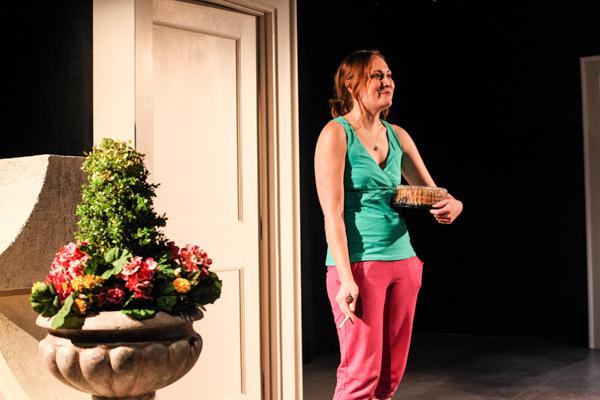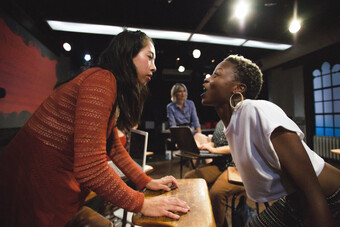Adolescence, Privilege, and Racial Identity in Annie Bosh is Missing
Annie (Caroline Neff) is back from rehab and trying to put her life back together in the gated community over by the country club under the gaze of her overbearing mother. Annie Bosh is Missing, a new play by Janine Nabers, is performed as part of the Steppenwolf Garage First Look Repertory of New Work. Of the fifteen minimalist, developmental productions Steppenwolf has presented through this initiative in the last five years, nine have received full premieres at professional theaters around the country. Nabers, a recent graduate of Julliard’s playwrighting program, has recently racked up a number of prestigious fellowships and recognitions. Her play is one of three running in repertory in Steppenwolf’s eighth festival, which also includes Aaron Carter’s The Gospel of Franklin and Edith Freni’s Buena Vista.
The play is set in Nabers’ hometown of Houston, just after Hurricane Katrina sent a flood of mostly Black refugees to seek shelter there in 2005. Racial anxieties simmer and bubble, as the city feels suddenly dangerous to many of the white residents of a privileged enclave, when black refugees from New Orleans flood the city. Annie at times runs towards and at times runs away from the “danger” of blackness.
Annie at times runs towards and at times runs away from the “danger” of blackness.
The fair skinned, curly haired siblings, we come to learn, are biracial. Neff and Seeber read discursively white, so when this revelation comes midway through the first act, it takes me by surprise. Nabers never tells the audience what happened between their parents—their father is just gone—nor does she attempt to spell out or simplify the relationship Annie and Patrick have to their biracial identity. Carol “chose to raise [them] in a segregated place” of a gated community in Houston; Annie needs to resolve her relationship to her blackness. This need drives the action of the play.
The quest for racial identity functions as a metaphor for Annie’s journey to differentiate herself from her mother, who is represented as overtly racist.
Annie develops a multilayered relationship with Samuel (Philip Edward Van Lear), a black man old enough to be her father. They meet as an internet hookup, and he is a seemingly decent guy who proceeds to follow her instructions to strangle her and whisper racist obscenities in her ear, and who she ultimately cannot go through with sleeping with. When she encounters him again in a very different context a few days later, both are shocked to see each other. He takes care of her, treating her with an almost paternal affection one moment, making out with her the next. At the play's climax, they are caught making out in a parked car late at night after a newly instigated citywide curfew. Though Samuel is in his 40s, wears a suit, and the audience knows him to be an affluent professional, the white police officer calls him "boy" and arrests him for being a black man with a white woman. Annie does not intervene, allowing Samuel to be cast as “black male criminal” while she is cast as “white female victim.” She does not ever really acknowledge how awful this act is. Annie may take responsibility for her addiction, but she does not grow up enough to take responsibility for the ways she treats most of the other characters in the play.
Annie Bosh is Missing is a coming of age story, as twenty-two year olds rebel against upper middle class country club norms. Of the five 20-something characters in the play, only one holds down a steady job managing a bowling alley, and all still live in their parents’ houses. In a lot of ways, Annie is actually more functional than her brother who graduated from college and still does bumps of coke while watching the news but "keeps it together," or her best friend Kims (Brittany Burch) who deals and uses and has had a baby her mother mostly takes care of. Annie holds down a job, finds moments in which she can connect to a co-worker (Ian Paul Custer), takes pride in small accomplishments, makes a friend (Krenée A Tolson), and tries to find some sort of normalcy and independence under her mother's surveillance.

Photo by Emily Schwartz.
The quest for racial identity functions as a metaphor for Annie’s journey to differentiate herself from her mother, who is represented as overtly racist. Yet that process is harder than it initially appears. Annie rebels against her mother’s racism, trying to differentiate herself, only to adopt the same racial stereotypes and conventions as her parent. Annie is both attracted to and repelled by blackness, and her journey through the play represents a messy, sometimes ugly process of trying to come to terms with her own racial identity. Nabers does not resolve this process or try to tie it up in a nice neat little bow—by the end of the play, Annie has not found the answers, she has merely learned how to ask some better questions.
Annie is a realistic representation of a teenage girl, but she also operates as a metaphor for privilege.
Annie is a realistic representation of a teenage girl, but she also operates as a metaphor for privilege. Her actions have serious consequences for those around her, but she emerges unscathed. She has the luxury not to clean up her own messes. She is able, by the end of the play, to leave her clearly dysfunctional (if upscale) family home. She can “pass”. Her discursive whiteness, her youth, her affluence, and her prettiness all buffer her from needing to take responsibility for the impact of her actions. Against the backdrop of Post-Katrina Houston, I cannot help but read Annie as a metonym for the United States more broadly, as the country felt bad for displaced refugees but did not actually take responsibility for rebuilding their devastated city. And we, like Annie, had the luxury to move on with our lives and stopped thinking about the fallout of hurricane Katrina once the news cycle moved on.







Comments
The article is just the start of the conversation—we want to know what you think about this subject, too! HowlRound is a space for knowledge-sharing, and we welcome spirited, thoughtful, and on-topic dialogue. Find our full comments policy here